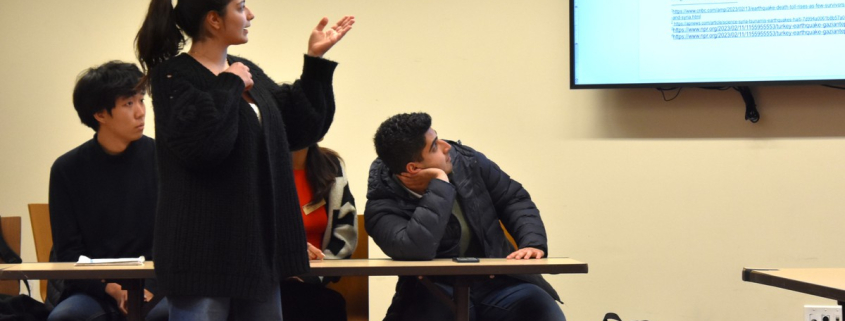USG calls on USC to support Turkish, Syrian students

The Undergraduate Student Government in a Senate meeting Tuesday unanimously passed a resolution calling on the University to provide support to students who were affected by the 7.8-magnitude earthquake in Turkey and Syria.
Co-executive director of the Middle Eastern and North African Student Assembly Nour Myra Geha said she was frustrated because the community received “no support from USC as an institution.” She cited President Carol Folt’s single post on her social media accounts and the University’s inability to send support emails to students of Middle Eastern and North African descent because of a lack of data. The Office of International Affairs only sent out emails to students that have not yet been naturalized, Geha said, overlooking students who grew up in the region but have since gained citizenship.
“A lot of our students feel [survivor’s guilt],” Geha said. “The only thing that we can do in order to take a step forward from that is [help] as much as we can, and this is what we’re asking.”
Senate Bill 142-45 called on the Office of the Provost to rectify the lack of accommodations for Turkish and Syrian students and to release a Universitywide statement regarding the earthquake. It also called for a more thorough method of identifying Turkish and Syrian students to further help outreach.
The first earthquake began in the early hours of the morning on Feb. 6 near the border between Turkey and Syria, and was followed by a 6.7-magnitude aftershock. The disaster displaced more than 5 million people and the death toll — having surpassed 40,000 at the time of publication — is continuing to rise as more people are being found beneath the rubble.
Senator Sam Habibi encouraged those present to donate to civilian cleanup efforts, drawing on his experience living in the Middle East to explain the severity of the situation.
“When something like this happens, it’s totally different when it happens here. All those people that you see pulling people out of broken structures [are] all civilians,” Habibi said. “Any dollar or any way you can help goes such a long way, especially in those countries.”
Senator Aidan Feighery said this was not the first time during the school year that the University had neglected to provide adequate support to students in need, citing a similar bill USG passed in September in the wake of the war in Armenia. The bill called on the Office of the Provost and President Carol Folt to send a universitywide statement raising awareness and support about the issue. Following the resolution’s passing, the University agreed to create better guidelines regarding when to post for student support — a promise it failed to keep, Feighery said.
“The fact that they haven’t made a more significant post yet or any sort of social media recognition means that those guidelines are either clearly not made yet or they need significant attention,” Feighery said. “I want to state my commitment to making that a legislative project in the future.”
Senator Navya Singh gave updates on projects currently in the works, including an update to the shared Lyft, 24-hour dining options and making Grammarly available for free for students. Singh’s projects are still in the first stages of planning.
Monica Rodriguez gave updates on her initiative to create murals at USC Village in collaboration with local artists from the South Central community. She is currently in the process of securing approval from University Village administration to begin work on the murals, she said.
“We want to start small so we can get feedback and see if there’s any hype [from] students before we expand to something bigger,” Rodriguez said.

